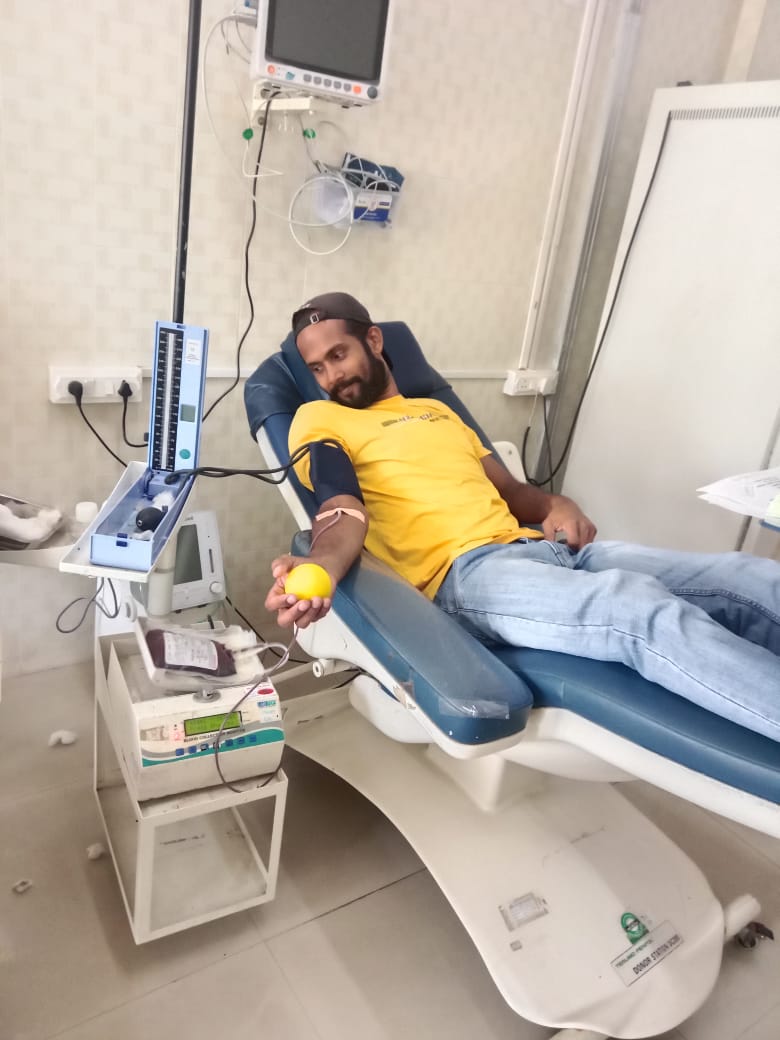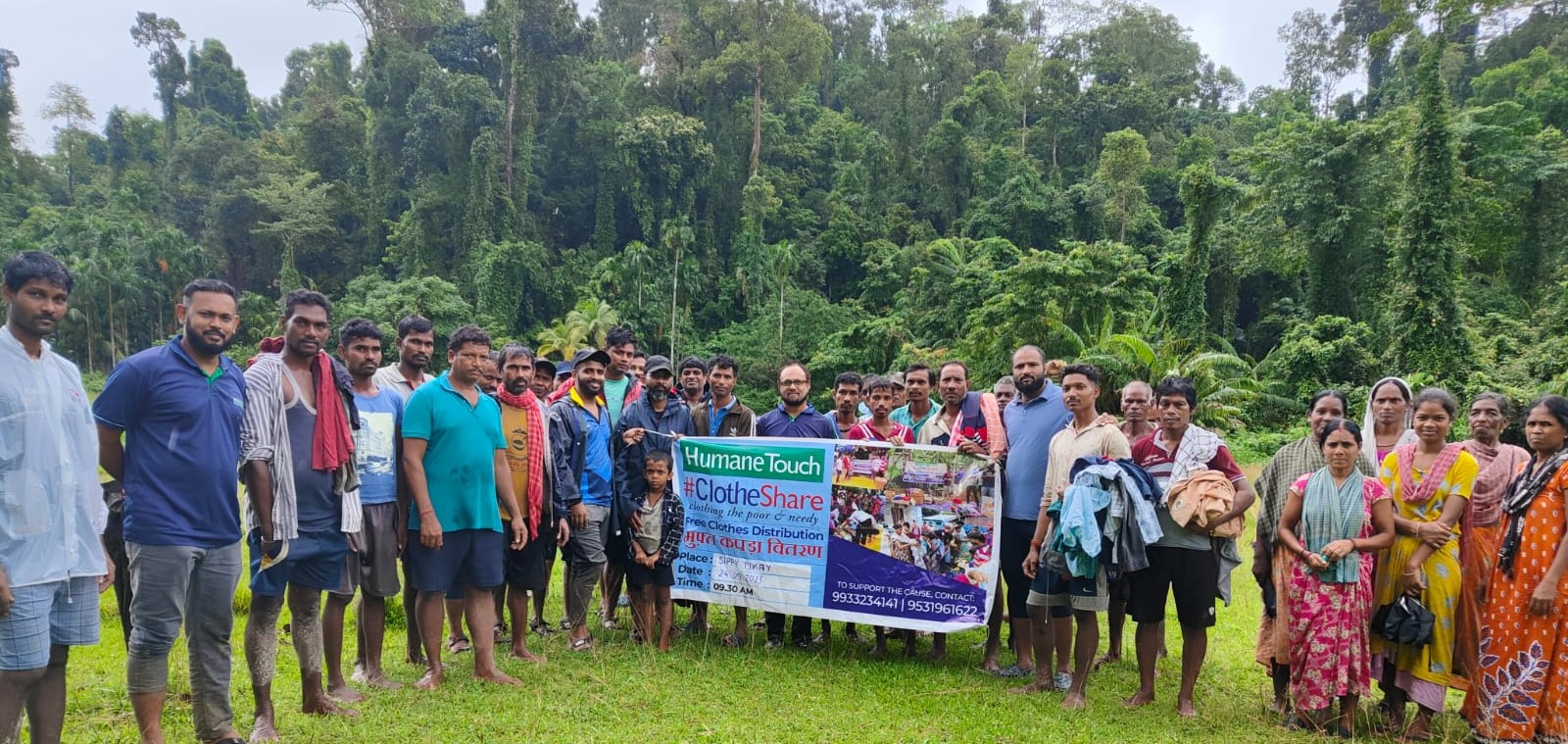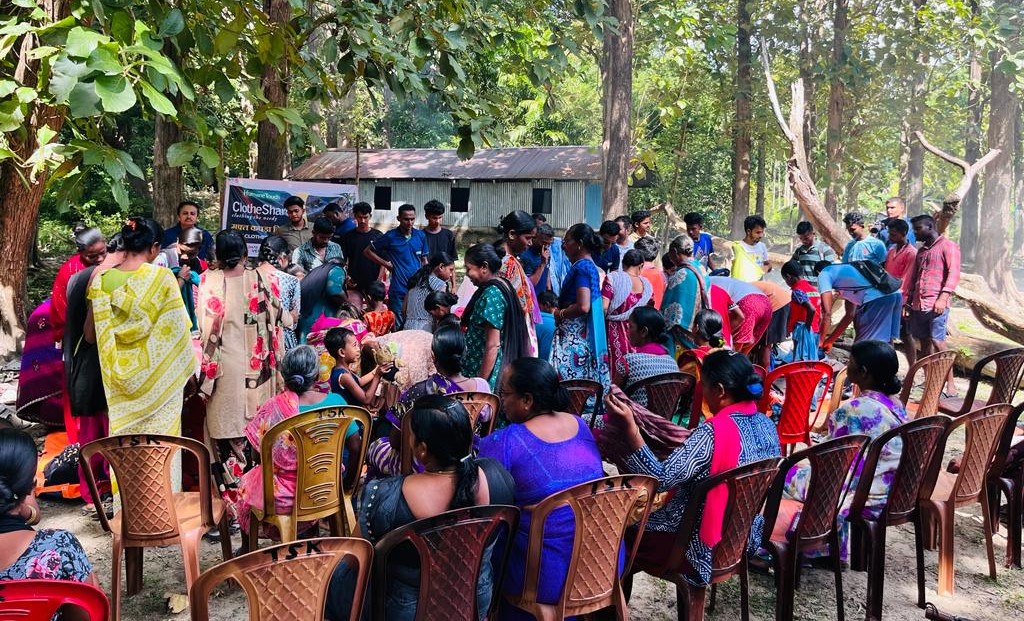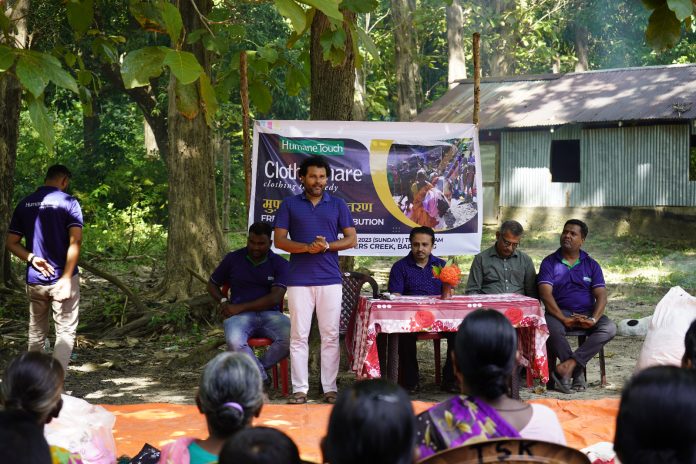– Sajida A. Zubair
Andaman Islands
After a year of red-zoned announcements in a south Andaman village, a call is received to help a lady patient with her dialysis, which required travel to another island to visit the only hospital that provides this facility to the islanders. A beacon of hope appeared in the form of HumaneTouch volunteers, while all the other modes of transportation were rendered completely immobile. The volunteers obtained necessary authorizations to drive the female patient to her dialysis services appointment in the personal vehicle of then-President Mujib Rehman. Today, she made a significant recovery.
An intriguing Union Territory of India is the Andaman and Nicobar Islands, an archipelago in the Bay of Bengal. This tropical paradise, made up of about 572 islands, is well-known for its breathtaking natural beauty, varied flora and fauna, and native tribal cultures. But in terms of accessibility, connectivity, and economic development, its remote location – roughly 1,200 kilometres away from mainland India – poses serious obstacles and limitations. Despite its attraction, this geographic separation makes it more difficult to move quickly and cheaply, which has an effect on trade, the development of infrastructure, and timely access to services and resources that are vital.
Umpteen problems
The geographical remoteness of islands presents a number of difficulties for its residents. It creates problems with connectivity and accessibility. Because the islands are dispersed, this isolation causes problems like restricted access to basic services like healthcare and education. Furthermore, there are limited economic opportunities, which could lead to problems with employment, livelihood, and infrastructure development. The challenge of preserving indigenous cultures while embracing modernity is distinct, and environmental issues like natural disasters and the effects of climate change have a big impact on the lives of the islanders.
 Access to advanced healthcare facilities is limited, and medical emergencies can be challenging to address promptly. The small population dispersed over several islands, coupled with the scarcity of infrastructure and specialized healthcare services, has resulted in an inadequate number of medical facilities. The majority of islanders spend a fortune on medical care on the mainland.
Access to advanced healthcare facilities is limited, and medical emergencies can be challenging to address promptly. The small population dispersed over several islands, coupled with the scarcity of infrastructure and specialized healthcare services, has resulted in an inadequate number of medical facilities. The majority of islanders spend a fortune on medical care on the mainland.
In addition, the islands are vulnerable to natural calamities like tsunamis and earthquakes. For the local populace, preparedness and responding to these calamities present significant challenges. One instance of a catastrophe where the islands lost their way of life and their land because they were unaware of the area’s vulnerability is the tsunami that struck in 2004. These vulnerable islands are too fragile to withstand the current spate of haphazard development initiatives. Maintaining the islands’ unique ecosystem and habitat while juggling development and tourism is another significant issue. While significant efforts are being made to address these issues, it is still a dream to improve the lives of the island communities through sustainable development, improved infrastructure, and easier access to basic services.
A social service initiative
To address these and other issues, a group of young and energetic Muslim youth founded HumaneTouch, a non-profit organization, in 2007. HumaneTouch, a social service initiative, aims to channel the energy of youth for constructive purposes. Regardless of caste, creed, or religion, HumaneTouch inspires the youth of the island to work toward social justice and human dignity with the goal of building a thriving community founded on mercy, justice, peace, equality, and ecological balance.
HumaneTouch has worked to improve thousands of lives over the past sixteen years by changing them in a profound way. A number of needy people without any financial support living in penury could be emancipated from their miseries by providing them with monthly ration items and financial assistance for self-employment projects. These schemes provide a regular source of sustenance, offering stability and support to those facing financial hardships and ensuring they have access to food despite economic challenges.
Alcoholism in the Islands
Another major issue in the A&N Islands has been alcoholism. According to research carried out by renowned journalist Mr. Zubair Ahmed, who passed away last year, “The island population of 4 lakhs and a couple of lakh tourists consumed not less than 52 lakh liters of liquor in 2015-16, an increase of 2.21 lakh liters from 2014-15. ANIIDCO, the sole distributor of IMFL, sold liquor for Rs 150 crore last year and made a profit of Rs 16.36 crore from liquor sales alone out of the Rs 19.03 crore net profit of the corporation. All other heads, including POL, milk, steel, air ticketing, and tourism activities combined, made a profit of just Rs 2.66 crore. Out of a total sale of 52 lakh liters, 37.11 lakh liters of hard liquor, 15.17 lakh liters of beer, and 0.39 lakh liters of ready-to-drink (RTD) alcoholic beverages were sold in 2015-16. While South Andaman consumed 35.58 lakh liters, other islands, from Campbell Bay to N&M Andaman, consumed 17.10 lakh liters.
“What is astonishing is the fact that Little Andaman, with no proper boat connectivity, a population less than 20,000, and no mentionable tourism footfall, consumed liquor to the tune of Rs 7.17 crores, while Havelock, the face of brand Andaman, the tourism paradise, registered a liquor sale of Rs 7.18 crores. There are 5 bars in Little Andaman and 12 bars in Havelock. Port Blair and surrounding areas of South Andaman, with around 125 bars, registered a sale of Rs 102 crore, or 68% of the total liquor sales in the territory. In outstation sales, Rangat spent Rs 12.83 crores consuming 4.58 lakh liters, and Diglipur, with a population of 43183, consumed 4.43 lakh liters, spending Rs 12.42 crores in the year 2015-16. Mayabunder residents spent Rs 80.13 lakh consuming 2.85 lakh liters of liquor. Diglipur has 19 bars and one ANIIDCO wine shop. In Mayabunder and Rangat, there are six bars and one wine shop each.”
Recognizing the gravity of the situation, HT Alcoholism Awareness campaigns have been organized independently and in collaboration with other government and non-government organizations, in which the vices of alcoholism are explained and chronic cases are referred for medical intervention.
K.P. Mohammed Younus, its charter president, stated, “The A&N Islands, which are 1200 km away from the Indian mainland, are bestowed with nature’s beauty but besieged with all the malaise that inflicts the youth elsewhere in the country. Alcoholism, drug addiction, and suicide were rampant in the island society. The affected families struggled hard to come out of this situation.
“HumaneTouch intended to fill this void by educating the masses about the ill effects of alcoholism and drugs. In the early phase, HumaneTouch embarked on this mission by organizing numerous grassroots-level programs in the villages of South Andaman. The movement gained momentum through public participation, resulting in the closure of the illegal sale of liquor and petitioning the government to stop issuing new bar licenses. Gradually, HumaneTouch expanded its activities to include career guidance, healthcare, a blood donor forum, financial aid to the poor, and raising environmental and social issues.”
Higher education
Due to the lack of options for higher education and high-quality education on the islands, students frequently have to leave the island to continue their education, which can be expensive. Most students who complete their 12th grade are forced to leave the islands to pursue higher education in mainland India, incurring significant expenses not only for their education but also for their travel.
HumaneTouch offers scholarships to deserving students in order to alleviate the financial burden of education. It began career guidance by inviting experts from various walks of life to guide them on what doors are open for them due to a lack of connectivity and expertise. It also recognizes and felicitates top board exam scorers.
Clotheshare program
Another remarkable HumaneTouch project is the Clotheshare program, which focuses on sharing used clothes and contributes to sustainability by extending the lifecycle of garments, reducing waste, and assisting those in need.
 These programs promote a circular economy by emphasizing the reuse and redistribution of clothing, fostering community engagement, and addressing social concerns by providing individuals with affordable clothing options while reducing environmental impact.
These programs promote a circular economy by emphasizing the reuse and redistribution of clothing, fostering community engagement, and addressing social concerns by providing individuals with affordable clothing options while reducing environmental impact.
 Before each distribution program, HT volunteers collect wearable clothes in good condition from donors and sort them according to age and type.
Before each distribution program, HT volunteers collect wearable clothes in good condition from donors and sort them according to age and type.
 Over thirty camps in both rural and urban areas have been held as part of this initiative, giving over 10,000 people access to well-worn clothing.
Over thirty camps in both rural and urban areas have been held as part of this initiative, giving over 10,000 people access to well-worn clothing.
Blood donation forum
Blood donation is critical for emergency situations, surgeries, and treating various medical conditions that require blood transfusions in areas where access to blood banks and medical resources is often limited. HumaneTouch’s blood donation forum has become an altruistic act that contributes to the community’s well-being and health, fostering a sense of solidarity and support among the islanders. HT blood donors directly contribute to saving lives and supporting the healthcare system, making a significant, positive impact on the health and well-being of those in need. Since its inception, HT donors have been donating blood, potentially saving lives, particularly on these islands where medical resources are scarce, thereby contributing to the availability of this life-saving resource when it is most needed. The HT volunteers never fail to amaze the islanders by arranging blood for a patient in need within seconds, just as Mumbai’s ‘Dabbawalas’ are super quick at delivering lunch in any part of Mumbai.
A request for an emergency blood donation for a dialysis patient (who had renal disease) was made to HumaneTouch in February of 2022. Within minutes, three HumaneTouch members arrived at the Government Hospital BambooFlat and saved a life by donating three units of blood. Later that morning, around 10 a.m., another call came in from GB Pant Hospital requesting four units of O+ve blood for a woman who was to undergo surgery. Members were informed that they could only donate blood until 12 p.m., as the blood bank closes at that time. Four members responded quickly to the call and were able to save another life.
These and other impact stories have earned HumaneTouch recognition from all corners of society, including the administration. The local administrations take HumaneTouch on board with their social initiatives including lokadalat, Campaign against drug abuse, legal awareness, etc.
HumaneTouch is a drop of humanity in a sea of chaos. Their volunteer services are a beacon of light demonstrating that selfless goodness still exists.




